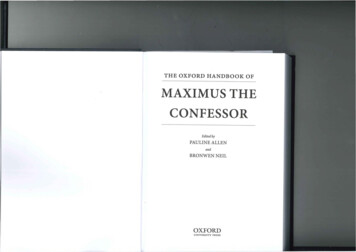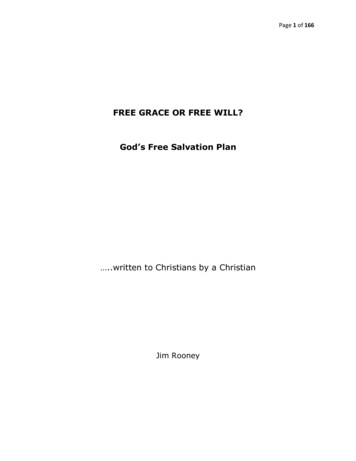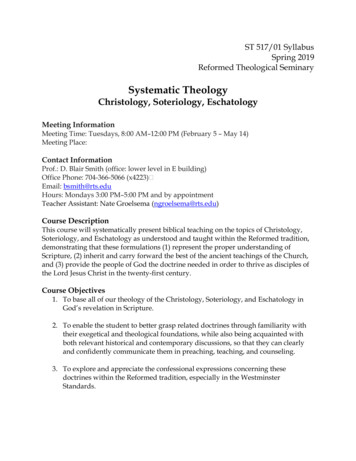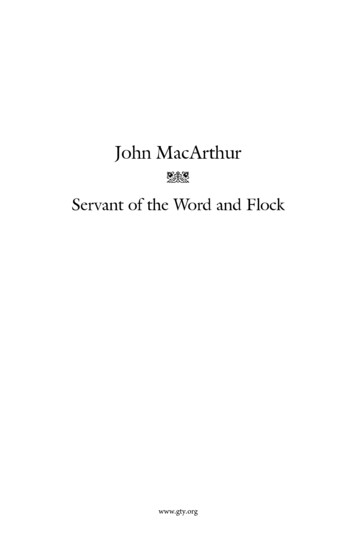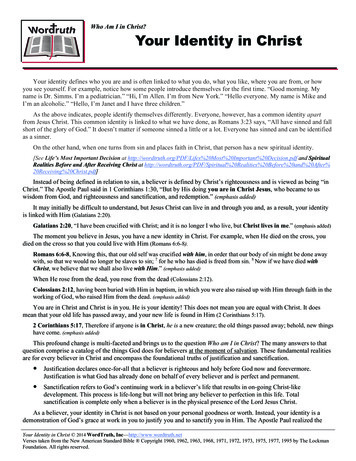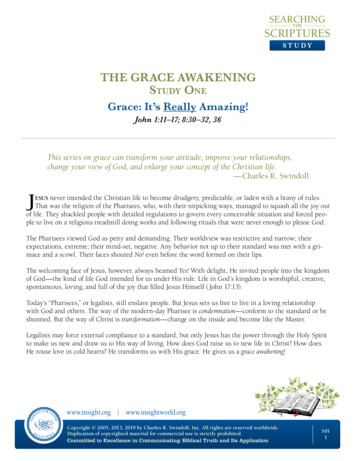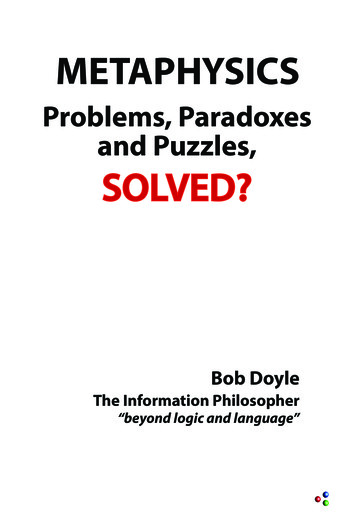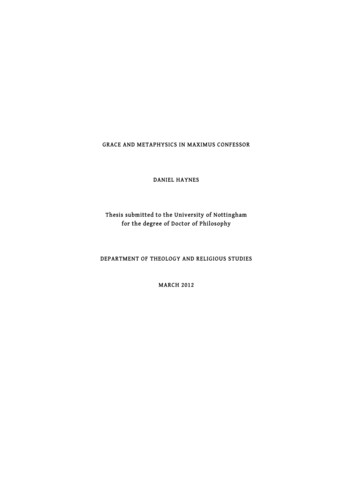
Transcription
GRACE AND METAPHYSICS IN MAXIMUS CONFESSORDANIEL HAYNESThesis submitted to the University of Nottinghamfor the degree of Doctor of PhilosophyDEPARTMENT OF THEOLOGY AND RELIGIOUS STUDIESMARCH 2012
ABSTRACTPost-Tridentine Western Christian theology introduced the notion of natura pura,which holds that one can know created nature in fact without reference to God ordivine grace. The orders of grace and nature are thus on different plains. Thisontology creates an extrincism between God and the world. Maximus Confessor’sdoctrine of grace offers the paradox of nature already presuming grace but awaitingthe supernatural grace of deification at the resurrection. Further, divine grace, orenergy in Maximus’s theology, are not separate ontological realms between God andthe world. Grace does not separate God’s essence from his energies. The Incarnationof the created and uncreated natures in Christ fully manifests the paradox of God’sgrace as being fully on the side of creation and on the side of God, withoutremainder. Finally, Maximus’s theurgic ecclesiology in his Mystagogy reinforces themediation of grace through created reality. All of these aspects of Maximus theConfessor’s theology of grace provide a Christian rendering of participation thatdoes not result in the extrincism of grace from nature, their conflation together, ora real distinction in the being of God.I
ACKNOWLEDGEMENTSI wish to first acknowledge the love and sacrifice of my wife Allison. Without hercaring support, this thesis would not have been possible. I also wish to acknowledgemy doctoral supervisor Dr. Mary Cunningham. Her masterful attention to detail andknowledge of patristic literature was of invaluable service to me. Also, I would liketo thank Prof. John Milbank for his support and open dialogue about metaphysics.His theological insights into my project were of the highest order. Also, without theeditorial abilities of Theresa Lindsey, my manuscript would be in a much poorercondition. Finally, I wish to extend my appreciation for the support of my parentsDennis and Kathie Haynes and my sister Heather Parker. They made the many yearsof study less burdensome and filled with love.II
ABBREVIATIONSACWAncient Christian Writers.Capita 150Saint Gregory of Palamas: The One Hundred and Fifty ChaptersCCSGCorpus Christianorum, Series Graeca, Brepols, Turnhout.CHPseudo-Dionysius: De Coelesti HierarchiaCHLGEMPCambridge History of Later Greek and Early MedievalPhilosophyCWSClassics of Western Spirituality.DNPseudo-Dionysius the Areopagite: De Divinis NominibusEHPseudo-Dionysius: De Ecclesiastica HierarchiaETProclus: Elements of TheologyEnn.Plotinus, EnneadsKLHans Ur Von Balthasar (trans. Brian Daley): Kosmic Liturgy.MCFMaximus Confessor, Fribourg Conference Proceedings, 1982.MTPseudo-Dionysius: De Mystica TheologiaNPNFSelect Library of the Nicene and Post-Nicene Fathers of the ChristianChurchPGPatrologiae Cursus Completus, Series GraecaPLPatrologiae Cursus Completus, Series LatinaIII
PTProclus: Platonic TheologySCh.Sources ChrétiennesSCGThomas Aquinas: Summa Contra GentilesSTThomas Aquinas: Summa Theologiae.The Works of St. Maximus ConfessorAd Thal.Quastiones ad Thalassium.Amb.Ambiguorum LiberCap. Gnost.Capita Theologica et Oeconomica.De Char.Centuriae de Charitate.LALiber Asceticus.Myst.Mystagogia.Or. Dom.Orationis Dominicae Expositio.Pyrrh.Disputatio cum Pyrrho.Qu. Dub.Quastiones et Dubia.Th. Pol.Opuscula Theologica et Polemica.IV
TABLESTABLEPAGE3.1 DIVINE UNIONS AND DISTINCTIONS80V
TABLE OF CONTENTSChapterPage1. INTRODCUTION .12. THE ESSENCE-ENERGIES DISTINCTION 163. METAPHYSICS OF GRACE I .494. METAPHYSICS OF GRACE II .1085. CHRISTOLOGICAL GRACE .1716. THEURGIC GRACE .2577. CONCLUSION .318BIBLIOGRAPHY 326VI
CHAPTER ONEINTRODUCTION‘Man is a hungry being. But he is hungry for God. Behind all the hunger of our life isGod. All desire in finally a desire for Him All that exists lives by eating But theunique position of man in the universe is that he alone is to bless God for the foodand the life he receives from Him. He alone is to respond to God’s blessing with hisblessing The world was created as the ‘matter,’ the material of one all-embracingEucharist, and man was created as the priest of this cosmic sacrament.’11.1 Grace, Nature and the Problem of ExtrincismFr. Schmemann beautifully comments on one of the signature characteristicsof Eastern Orthodox theology: a strong sacramental view of the cosmos. The reasonwhy a Eucharistic cosmos organically expresses the irreducible relationshipbetween God and the world is because grace is not extrinsic to created nature in theEastern Orthodox theological worldview. This is not to say that God and the worldare conflated or mixed in a pantheistic manner, but the Christian East does affirmthat created nature already assumes the gift of grace, which then awaits theconsummation of supernatural grace and deification.2 The grace of creation andsupernatural deification are not, as Maximus Confessor attests, ‘a reward given tothe saints in requital for righteous works, but is proof of the liberality of theAlexander Schmemann, For the Life of the World (Crestwood, NY: St. Vladimir’s Seminary Press, 1973),p. 1.12Maximus Confessor, Ad Thal. 60 (CCSG 22: 77).1
2Creator.’3 God is the beginning of creatures as Creator and their end as the giver ofeternal life, but the middle journey of existence is up to the creature’s free-will.4 ForMaximus, there is a synergy at work between the human being and God in theprocess of deification that is at the same time entirely based upon the utter gratuityof divine gift. The synergy of grace and nature provides the foundation for a cosmicdance and harmonious symphony that allows the whole creation to fully andwilfully participate in the vita Trinitatis. In Maximus’s theology, grace, nature andmetaphysics all coalesce into a single theophanic revelation of, and participation in,the triune God.After the Counter-Reformation of the Catholic Church in the sixteenthcentury, there emerged an ontology in the West that differed from the patristic andmedieval understanding of nature. Post-Tridentine Catholic theology developed thenotion of natura pura.5 Hans urs Von Balthasar describes three ways in which graceand nature have been understood since this time period: the first path, held byRipalda, assumes that every act is shored up with grace; the second middle pathargues that nature is intact, and then it is intercepted by grace in order to be3Maximus, Th. Pol. 1 (PG 91: 33A-36A).4Maximus, Amb. 7 (PG 91: 1073B-1076C).For a recent argument for natura pura and a counter to Henri de Lubac’s thesis of naturepresupposing grace—and subsequently a rebuff against concerns of some in the contemporaryRadical Orthodoxy movement—see Bernard Mulcahy, Aquinas’s Notion of Pure Nature and the ChristianIntegralism of Henry de Lubac: Not Everything is Grace (New York, NY: Peter Lang Publishing, 2011).5
3directed towards its supernatural end; and the third path, held by Billot, suggests afinality of pure nature in the world order.6 Von Balthasar concludes that after thehigh scholastic period, all of the systematics of grace and nature removed theologyfrom the identity of nature:In all these systems that have been developed since the CounterReformation, we notice a distinct tendency to protect the concept of naturefrom the danger of Protestant subversion. But the tendency goes so far thatpost-Tridentine Catholic theologians not only try to set off nature from sinand grace but also feel obliged to prove that the sphere of nature can beisolated and depicted in fact.7A vacuous notion of being and nature did not just develop in post-TridentineCatholic theology and twentieth century Protestant theology—as for instance inKarl Barth’s resounding ‘Nein!’ to natural theology or any theology relating to theanalogia entis.8 There was an abstraction from nature in the philosophy of Being aswell. In Hegel’s The Science of Logic, he argues that ‘pure being and pure nothing aretherefore the same. The truth is neither being nor nothing, but rather that beingHans Urs von Balthasar, The Theology of Karl Barth: Exposition and Interpretation (San Francisco, CA:Ignatius Press, 1992), p. 289.67Hans Urs von Balthasar, The Theology of Karl Barth, p. 289.For an in-depth collection of articles on the nuances of the analogia entis debate, see Steven A. Long,Analogia Entis: On the Analogy of Being, Metaphysics, and the Act of Faith (Notre Dame, IN: University ofNotre Dame Press, 2011). Also, Thomas Joseph White, The Analogy of Being: Invention of the Antichrist orWisdom of God? (Grand Rapids: MI, William B. Eerdmans Publishing, 2010). Maximus will develop hisown analogia entis, but it transforms into what I call the analogia Christus.8
4has passed over into nothing and nothing into being’9 Being is only affirmedthrough the absolute negation or abstraction from Being. In Hegel’s dialecticalphilosophy, which subsequently influenced Karl Barth’s refutation of naturaltheology, abstraction and negation undermine paradox and participation in God.The Post-Tridentine Catholic notion of natura pura, the Hegelian abstraction fromBeing, and the Protestant rejection of natural theology and the analogia entis lead toa very extrinsic relationship between nature and grace. As Steven A. Long notes inreference to Thomas Aquinas:Nature is not merely a negative concept, a sort of empty theologicalNewtonian space providing a hold ‘place’ or vacuole for grace. And preciselyinsofar as human nature has an ontological density and proportionate end,just so far is the knowledge of these essential to the work of the theologian.This is precisely why St. Thomas held that grace presupposes nature—not asan empty placeholder, but with its own created perfection positively orderedtoward God within natural limits while being capable with divine aid ofelevation to divine friendship and the beatific vision.10In order to avoid nature being merely a ‘vacoule for grace,’ several Catholic andAnglican theologians in the twentieth century argued for an integralist perspectiveon nature and grace rooted in the church fathers and later Catholic tradition.1.2 Twentieth Century Debates on Nature and GraceGeorg Wilhelm Friedrich Hegel, The Science of Logic, trans. George di Giovanni (Cambridge, UK:Cambridge University Press, 2010), p. 59-60.9Stephen A. Long, Natura Pura: On the Recovery of Nature in the Doctrine of Grace (New York, NY:Fordham University Press, 2010), p. 2.10
5In 1953, Catholic, Orthodox and Reformed Protestant scholars met at themonastery of Chevetogne in France to discuss the theology of grace that eachtradition affirms. After a thorough investigation of their respective positions, thedifference between the three groups of Christendom was summarized as follows:All Christians appear to agree perfectly, until one comes to express insystematic formulae the very complex encounter of divine and humanactivity in grace. On the one hand, all the Christian confessions accept somechange in man, brought about by justification; on the other hand, theChristian life that follows this change is not described in the same way. AnOrthodox would say that the change made by grace makes a divine lifepossible; a Catholic, a holy life; while a Protestant would stress the battleagainst sin and the Devil. The encounter between God and man, in theprocess of salvation would be described as a ‘synergism’ (Orthodox), an‘enduring creation’ (Protestantism), or ‘actuation créée’ par acte incréé’(Catholicism) The divisions due to different systematizations are moreserious when we come to the question of created grace, of ‘virtues’ and gifts.Two things are presupposed here: the first, which explains the scholastictheory of the habitus, assumes the philosophical idea of a distinctionbetween the soul and its faculties; the other, much more important, impliesdifferent views of the relations between man and the supernatural. ForCatholicism, the fundamental distinction is between nature andsupernatural, and the problem of grace results from the nature of man; for theProtestant, on the other hand, grace is essentially ‘what comes downtowards the sinner.’ In short, one side contrasts natural and supernatural, theother sin and grace.11This summary of the ecumenical meeting of minds at the monastery of Chevetogneillustrates that each tradition attempts to address the question of how atranscendent God connects and relates to His creation. I will briefly discuss theC. Moeller and G. Philips, The Theology of Grace and the Oecumenical Movement, trans. R. A. Wilson(London: A. R. Mowbray, 1961), pp. 37-38.11
6Catholic retrievals of integralism in the twentieth century, and then elucidate howtheir theology of resourcement will be connected with this study of grace andmetaphysics in Maximus Confessor.Catholic theologian Henri de Lubac argued around the middle of thetwentieth century that the extrinsic position on nature and grace was not thepatristic and medieval view. Neoscholastic theology held to a two-tier account ofnature and grace, where grace is interpreted to be something supernaturally addedto human nature, which was already complete and sufficient in itself. It wasassumed that this way of thinking would avoid Pelegianism and re-emphasize theAugustinian view of the absolute gratuity of grace. De Lubac believed that therewere several critical problems with this viewpoint. If humans have a ‘natural desirefor the beatific vision’ (desiderium naturale visionis beatificae), then how can grace besuper-added and not destroy human nature? How is an extrinsic understanding ofgrace to be avoided? De Lubac argues in his book The Mystery of the Supernatural, thatmodern theology:Sees nature and supernature as in some sense juxtaposed, and in spite ofevery intention to the contrary, as contained in the same genus, of whichthey form as it were two species. The two were like two complete organisms;too perfectly separated to be really differentiated, they have unfoldedparallel to each other, fatally similar in kind. Under such circumstances, thesupernatural is no longer properly speaking another order, something
7unprecedented, overwhelming and transfiguring.they will no longer betaken to be anything but affirmations of a purely natural philosophy.12The unprecedented aspect of the supernatural does not correspond tohuman nature in a two-tiered hierarchy of different orders, but as a paradox of twoaspects of the same order. 13 De Lubac further argues that for the fathers and earlymedieval theologians, there is permanence between human action and supernaturalgrace, so that the desire for the beatific vision already points to grace in thecreature.14 This means that grace is not just a potential thing to be given to a person,but already a living reality within nature, a ‘promise’ already ‘inscribed andrecognized in the being’s very self.’15 De Lubac holds these two perspectives in aparadox without allowing the collapse of the two ideas or the banality of theirseparation.The gift of this natural desire for the supernatural is also not one ofnecessity for God or the basis for offering the gift of grace.16 For De Lubac, God freelyHenri de Lubac, The Mystery of the Supernatural, trans. Rosemary Sheed (New York: CrossroadHerder), p. 37.12See John Milbank, The Suspended Middle: Henri de Lubac and the Debate Concerning the Supernatural(Grand Rapids, MI: Wm. B. Eerdmans Publishing, 2005); see also Eric Lee, ‘Paradoxes of Faith inKierkegaard and de Lubac’ in Belief and Metaphysics, eds. Connor Cunningham and Peter Candler(London: SCM Press, 2007). pp. 236-259.1314Henri de Lubac, Mystery of the Supernatural, p. 27.15Henri de Lubac, Mystery of the Supernatural, p. 207.16Henri de Lubac, Mystery of the Supernatural, p. 207ff.
8gives this desire as the author and creator of nature. Further, patristic and earlymedieval theologians changed the definition of nature from that of Aristotle, whoheld that the end of the creature must be reachable using its own resources.17 PaceDe Lubac, Rudi te Velde and John Milbank have more recently commented thatAquinas denied this restriction of nature through his real distinction betweenexistence and essence in creatures. Aquinas understood grace from a teleologicalinterpretation of nature, but he still argues that beatitude is a supernaturalconsummation.18 Humans were created to participate in the life of the Trinity;however, this natural desire does not have its fulfilment from within the humanbeing.1.3 The Scope of Maximian GraceSince the Christian East did not deal with the Augustine vs. Pelagius issue to thesame degree as the West, it is sometimes asserted that the East does not really havea theology of grace, but this is far from the case. The Christian East did notemphasize the role of grace to the extent that the West did in their theologicaldevelopment, but grace is the prior term that grounds most of their doctrines. Thecore of Maximus’s metaphysics is the grace of God. Maximus states that deification17Aristotle, Nicomachean Ethics 1.2 (1024a 20).Rudi te Velde, Aquinas on God: The Divine Science of the Summa Theologiae (Burlington: AshgatePublishing, 2006), p. 150 ff. See also John Milbank and Kathrine Pickstock, Truth in Aquinas (New York:Routledge, 2000), pp. 24-39.18
9is ‘to reunite by love created with uncreated nature, showing the two in unity andidentity through the acquisition of grace.’19 The greatest act in a creature’sexistence is a union of love with its creator. Maximus, as well as the Greek patristictradition, holds that this union is only due to the grace of God.The grace vs. nature debates in twentieth century theology encountered aradical twist in thought of Henri de Lubac his notion of the paradox of grace. Thisparadox has two main results for Christian theology that follow one upon the other.The first is that grace and nature are two aspects of the same order, not twoopposing orders. The second is that grace is both created and mediated within thecreation and uncreated with its source in God. Grace is thus a ‘suspended middle’20because there is no ontological intermediary between God and the creation.Since de Lubac’s critique of the neoscholastic reading of Aquinas on the issueof created grace, a new avenue for dialog about grace opens up for Eastern Orthodoxand Western Christian traditions. What de Lubac’s thesis offers for a study ofMaximus Confessor is the schema of paradox with the two-fold result mentionedabove. Maximus describes the relationship between divine grace and nature (that is,the natural relationship with grace that the human person has through the logoi of19Maximus, Amb. 41 (PG: 91, 1308 B).20John Milbank, The Suspended Middle.
10created being coupled with the telos of deification and beatitude beyond humannature given by God) in several places.21 He almost always frames grace and naturewithin an eschatological consummation of all creation in deification. Paul Blowersdescribes nature and grace in Maximus as ‘the protological endowment and theeschatological vocation of humanity.’22 The coalescence between grace and nature isa part of Maximus’s created ontology, but the eschatological fulfilment ofdeification is something that transcends human nature and must be given by God. Itis the paradox of something already given and created but awaiting consummationfrom beyond in the uncreated God:Deification does not belong to what lies within our potentiality to bringabout naturally, since it is not within our power. For no logos of that whichtranscends nature lies within nature. Therefore deification is not anaccomplishment that belongs to our potentiality: we do not possess thepotentiality for it by nature, but only through the divine power, since it isnot a reward given to the saints in requital for righteous works, but is proofof the liberality of the Creator, making the lovers of the beautiful byadoption that which he has shown to be by nature.23Maximus Confessor offers a vision of the whole cosmos that is without theextrincism of post-scholastic theology precisely because he connects created graceand uncreated grace in an irreducible manner, which is exemplified in the21Maximus, Cap. Gnost. 1.55; De. Char. 3.25; Ad Thal 35; Th. Pol. 1.Paul Blowers, On the Cosmic Mystery of Jesus Christ (Crestwood, NY: St. Vladimir’s Seminary Press,2003), p. 93 n. 18.2223Maximus, Th. Pol. 1 (PG 91: 33A-36A).
11Incarnation and revealed through his ontology of what I call the analogia Christus.Through participation (which is another word for grace in Maximus), his theologyholds the divine and natural worlds both together and apart, in union anddistinction.The proposal of this study is that the theology of grace in the thought ofMaximus Confessor unites God and the creation together in an irreduciblerelationship, all-the-while avoiding any hint of pantheism. Further, Maximus doesnot separate the essence and energies (or grace) of God. Instead, grace is alwaysbeing created or infused directly in the soul of the creature, and through the soul tothe body. The uncreated grace of God is the sharing of the divine nature with thecreature through the grace of participation. The Confessor thus offers an alternativemodel to the extrinsic understanding of grace and nature.1.4 The Reason for Studying Grace in MaximusMaximus Confessor (C. 580 – 13 August 662) is a man of both East and West inthat, more than any other Eastern patristic writer, he discussed: the role of the willin human anthropology, original or ancestral sin, grace, adoption, justification, theprimacy of the Roman Pope, and the filioque clause. Sometimes Maximus interpretsthese theological topics differently than Western theologians, but he shows us thatthe East was not without some reflection on these supposedly important LatinWestern theological concepts. Maximus also spent time at the Lateran basilica
12during the Monothelite controversy (October 649 CE) supporting Pope Martin Iagainst the Typos of Constans II.24 His support of the Latins during this period wasnot due to submission to the Pope qua Pope, but more to Pope Martin’s adherence toorthodoxy.In the account of his first trial in Constantinople in June 654 CE written byhis disciple Anastasius, Maximus is asked by his questioner, ‘Why do you love theRomans and hate the Greeks?’ To this the blessed saint replied, ‘We have a preceptwhich says not to hate anyone. I love the Romans as those who share the same faith,and the Greeks as sharing the same language.’25 The Confessor moved in the worldsof both Byzantium and Rome, and his thought reflects these relationships. By fullyembracing the implications of the paradox of grace and nature in Maximus, bothEastern and Western Christian traditions could find common theological groundonce again.So, then, an analysis on Maximus’s doctrine of grace is needed for three keyreasons. First, there has not been an in-depth study on grace in the Greek patristictradition that treats the whole breadth of the literature. While a full analysis of theGreek fathers on grace is well beyond the range of this study, an investigation ofAndrew Louth, Maximus the Confessor, The Early Church Fathers Series (New York, NY: Routledge,1996), p. 17.2425The Trial of Maximus, trans. Berthold, Maximus Confessor, p. 26.
13grace in Maximus’s thought will greatly contribute towards a better understandingof the Greek fathers on the topic. Second, by looking at the diverse and multifacetedreflections on grace in the East, perhaps Western theologians might be compelled tocorrect interpretations of grace that have contributed to the continuance ofextrincism in modern times. In the spirit of De Lubac’s resourcement, going back topatristic sources can address the problem of extrincism. Finally, as stated abovethere is an ecumenical imperative in such a study of Maximus’s thought. Since theschism of Eastern and Western Christendom in 1054 CE, there has been a great dealof misalignment and misunderstanding between the two great traditions.While studying grace in Maximus may not dissolve all differences betweenEast and West into some kind of a homogenous unity, there is still the need to bringto the surface a broader recognition of the common ground between the twotraditions.26 For Maximus, this is true both for grace and for the other traditionallySince the Second Vatican Council's Decree on Ecumenism and Decree on the Catholic Eastern Churches,there have been several develops in ecumenism between the Roman Catholic and Eastern Orthodoxchurches. The North American Catholic-Orthodox theological dialogue has produced two majoragreements: 1) the Eastern Orthodox signatories to a detailed study and ‘Consultation Statement’ onthe Filioque (October 25, 2003) are in agreement that the Filioque doctrine should no longer be seenas heretical; and 2) The result of the Agreed Statement on ‘Baptism and 'Sacramental Economy,'‘ alsoissued by the North American Orthodox Catholic Theological Consultation (June 3, 1999), which callsupon the Orthodox Patriarchs to repeal the 1755 decree denying the validity of Catholic baptisms. Inrelation to the Anglican Communion and the Eastern Orthodox Church, there have been threephrases of dialog by the International Commission for Anglican-Orthodox Theological Dialogue: theMoscow Agreed Statement of 1976; the Dublin Agreed Statement of 1984; and more recently the CyprusAgreed Statement of 2006. For the Protestant branch of the Church, see eds. John Meyendorff andRobert Tobias, Salvation in Christ: A Lutheran-Orthodox Dialogue (Minneapolis: Augsburg Press, 1992).26
14Western subsets of it, such as adoption, justification, atonement, sanctification, etc.This study of Maximus Confessor will not seek to ignore the important differencesthat exist between these two Christian traditions, but simply to point out areas ofagreement and continuity between them. The greater ecumenical desire would beto see at least a small step towards reconciliation and communion between theGreek East and the Latin West, and Maximus the Confessor is a key theologian toprovide such a bridge.1.5 The Scope of this StudyI will begin this study on grace and metaphysics in Maximus Confessor inChapter Two, where the essence and energies distinction will be analysed. Thisimportant theological debate between Christian East and West is directly related tothe understanding of grace as uncreated and created. Then in Chapter Three, I willinvestigate the divine processions of Pseudo-Dionysius and their relationship toenergy and grace in Maximus. Chapter Four will elucidate how the divineprocessions/energies were received in the Byzantine and Latin traditions, and I willargue that Gregory of Palamas is not an accurate reader of Maximus on the divineenergies. I will demonstrate that grace provides the necessary element inunderstanding what Maximus means by divine energy. Chapter Five will evaluatehow Maximus’s Christology completely encapsulates his theology of divine grace
15and the revelation of the logoi of essences through the analogia Christus. Finally, inChapter Six, I will show that Maximus’s Ecclesiology is thoroughly theurgic. Astrong theology of descending grace is mediated in Maximus’s metaphysics throughliturgical act.
CHAPTER 2THE METAPHYSICS OF GRACE: THE FOUNDATION OFTHE ESSENCE AND ENERGIES DISTINCTION‘Christ in his love unites created reality with uncreated reality—How wonderful isGod’s loving-kindness towards us!—and he shows that through grace the two arebecome one. The whole world enters wholly into the whole of God and by becomingall that God is, except in identity of nature, it receives in place of itself the wholeGod.’12.1 The Essence and Energies Debate: East and WestIn order to understand how metaphysics and grace coalesce in Maximus’stheology, one must first query about the nature of God and the problem of how acompletely transcendent and simple divine being touches and unites with creation.In the Eastern Orthodox tradition this problem is answered through a distinctionbetween God’s essence (ουσία) and His energies (ενέργειαι). Grappling with thisdense theological debate is necessary because the position one takes on the essenceenergies debate will determine how one understands grace from a metaphysicalpoint of view. On the one hand, if God’s energies are uncreated and transcendentfrom the world, then God’s grace is also uncreated and transcendent from theworld. This is the Eastern Orthodox perspective on the metaphysics of divine grace.On the other hand, if God’s energies are created in the economy of salvation (a1Maximus, Amb. 41, (PG 91: 1308B).16
17simple God cannot have energies proper), then God’s grace is also created. This isthe Western perspective on the metaphysics of divine grace.Aside from the filioque clause, there are few theological topics between Easternand Western Christian theology that creates as much division as the theological andmetaphysical distinction between the essence and energies of God. ContemporaryEastern Orthodox scholars contend that this distinction (although not a divisionaccording to them) in God between His essence and energies has been neglected bythe West both philosophically and theologically.2 For Western theologians, God isunderstood to be simple and non-compounded, and there is no room in the Divinenature for a separate metaphysical distinction of energy that would cause a divisionin the Godhead and create a composite divine nature (σύνθετος).3In the Western schema of God’s essence and energy, energy is understood ashis actions in the cosmos as part of his economy, not as something separate from hisessence ad extra. God’s essence and God’s existence a
supernatural deification are not, as Maximus Confessor attests, ‘a reward given to the saints in requital for righteous works, but is proof of the liberality of the """"" 1 Alexander Schmemann, For the Life of the World (Crestwood, NY: St. Vladimir’s Seminary Press, 1973), p. 1. 2
